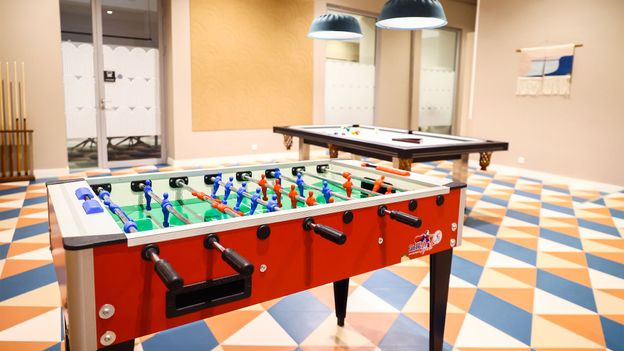By Lillian StoneFeatures correspondent
Offices with amenities attracted workers in the past – but they don’t fit their post-pandemic lifestyles (Credit: Getty Images)
Companies are clawing to bring back pre-pandemic perks and that ‘family’ feeling – but employees want something more tangible.
Many employers are calling employees back into offices, trying to restore the workplace of pre-pandemic days. Along with filling seats, they’re also looking to bring back another relic: office culture.
Pre-2020, office culture was synonymous with the ‘cool’ office: think places to lounge, stocked pantries and in-office happy hours that went all out; or luxe retreats and team-building exercises meant to foster the feeling of ‘family’. In past years, these perks drew many workers to the office – in some cases, entire companies defined themselves by their office cultures.
The world of work looks and feels entirely different than just a few years ago – yet many companies are still intent on recreating the office cultures workers left behind as they abandoned their desks in 2020. While these companies are making some gestures to adapt – for instance, redesigning spaces to accommodate new preferences and hybrid-work habits – many are still set on bringing back what lured in workers before the pandemic.
Yet swaths of employees simply aren’t interested in going backward. Instead of trust-falls and cold brew on tap, employees are demanding flexible work, equitable pay and a focus on humanity in the workplace that transcends the perks they sought years earlier.
Workers’ shifting priorities are a natural consequence of the Covid-19 pandemic, says Georgina Fraser, head of human capital for global commercial real-estate firm CBRE. “The pandemic gave us autonomy in a way that we haven’t had previously,” she says. “It gave us the opportunity to choose how we structured our working days.”
Flexibility, personal support and remote work are far more important to employees in a post-pandemic world (Credit: Getty Images)
And now that workers have experienced that level of work-life balance, they won’t settle for less. Fraser adds: “Post-pandemic, we saw a resurgence of people being very vocal about what they wanted and needed, not just from office culture, but from the wider world.”
Now, she says, workers aren’t shy about “wanting to be seen as a whole human – and that filters down to their physical location, how [employers] manage them, what support they receive and how [employers] integrate technologies between home and office in order to support them”.
One major factor in this changing attitude is that many employees feel office culture simply isn’t applicable in a remote- and hybrid-first world, where the physical office can feel superfluous. Now that the workplace doesn’t serve as the culture hub it once did, “companies have really struggled to redefine the role of the office”, says Lewis Beck, CBRE’s head of workplace for Europe. Office culture that was once meant to get employees excited doesn’t have the same pull when workplaces are only one-third full.
And workers who are interested in – or required to do – office work aren’t looking for many of the perks that defined culture before 2020. This is especially the case for young employees.
“We call Gen Z the ‘activist generation’, and we’re seeing them demand more accountability,” says Fraser, pointing to amenities like gender-neutral toilets, eco-friendly snack options and office spaces that offer more opportunities to build community. She also notes: “We’re seeing heightened expectations around those moments that don’t have to do with work – whereas, pre-pandemic, people would come in focusing [more strictly] on work.”
Plus, as young people compose more of the workforce, not only are they not excited about the office culture of past – they’ve never experienced it.
“I’ve never known an office culture that was not remote,” says 24-year-old Jamie Masterson, a digital marketing specialist who entered the US workforce in 2021, in the throes of the Covid-19 pandemic. “I’ve heard about the infamous ‘fun’ activities in the office – cool downtime areas, ping-pong tables, things like that. And I don’t think I’ve ever been wildly intrigued by them.”
Masterson, instead, is more interested in tangible benefits like pay, healthcare and flexible time off. “People take breaks in their own way and can form connections in their own way. [Office perks] being considered ‘benefits’ compared to something actually beneficial – something monetary – during a time when people are in crisis and our country’s in crisis, it just feels a little tone-deaf.”
And amid years of mass layoffs that continue with a steady drumbeat, workers are more concerned with financial security and wellbeing. This can make the focus on office culture feel particularly out of touch for workers like Masterson.
Ultimately, there’s nothing wrong with fun office perks – but if a company can’t back them up with tangible benefits to improve employees’ lives, they’ll miss out on talent. “The next generation is very comfortable advocating for their needs,” says 32-year-old Juan Franco,an associate director of operations working in higher education. “And if a company is not adapting to their needs, they can’t expect to keep that employee happy.”
Masterson agrees: “Obviously, culture is cool, but at the end of the day, we all need to survive.”
Related
More





